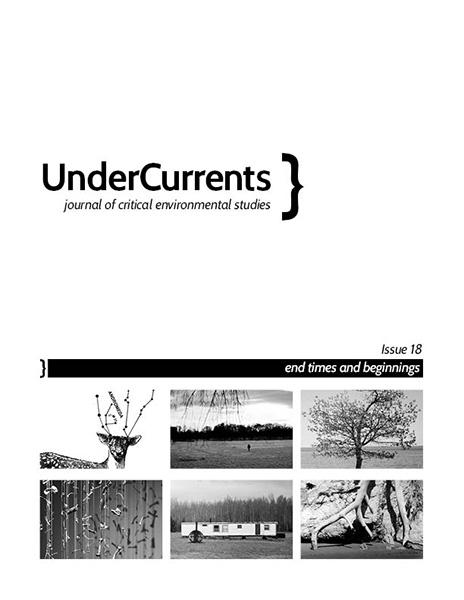Health and Sustainability in the Canadian Food System: Advocacy and Opportunity for Civil Society
DOI:
https://doi.org/10.25071/2292-4736/38552Abstract
Health and Sustainability in the Canadian Food System: Advocacy and Opportunity for Civil Society.
Edited by ROD MACRAE and ELISABETH ABERGEL. UBC Press, 2012. $95.00
Reviewed by Crystal Lamont
Think about what you did today. What did you eat? Food is such an integral part of everyday life, but how often do you think about food as more than a means to stop that annoying grumble in your stomach? Health and Sustainability in the Canadian Food System: Advocacy and Opportunity for Civil Society takes a look into Canadian food systems and the ineffective and unresponsive policies of the Canadian government regarding food, as well as the agricultural challenges of today and tomorrow. The contributions to this edited volume strive to illustrate how effective and sustainable food policies can be achieved in the Canadian food system. This book explores different food problems and policies to advance the notion of civil society organizations (CSO’s) as powerful vehicles to invoke the sort of changes Canada requires in its food systems.
Health and Sustainability in the Canadian Food System engages with issues surrounding food and agricultural policies in Canada using an interdisciplinary approach. This volume brings together scholars in geography, sociology, political science, and environmental studies, as well as authors who work in the field of food policy to explore the role of advocacy and CSO’s by drawing on these diverse perspectives and experiences.
Many of the authors use case studies from other environmental struggles as a way to explore effective advocacy in working toward change in Canadian food policy. Overall, the reader comes to appreciate the role CSO’s can, and ought, to play in achieving a policy paradigm shift in Canadian food and agriculture.
Contributors in the first section of the book investigate and challenge the current food and agriculture policy paradigms in Canada by questioning the very problematic ways that farming practices and the purpose of agriculture are discussed in dominant public narratives. Scholars Grace Skogstad and Alison Blay-Palmer argue that the current dominant view of farms is resource production. Commonly, farming and agricultural practices are conceptualized solely as means to provide food to people. As a result, policies tend to focus on maximum production strategies while failing to support sustainability measures or to facilitate environmental protection. Skogstad and Blay-Palmer both suggest how policies can be shaped to enable long-term and systematic changes that view farming within a larger context of public good and the multiple benefits farms provide to communities in addition to food. One illustration of a successful paradigm shift discussed in this section and used in contrast to Canada’s current food and agricultural model is the European Union’s multifunctionality paradigm. The principles of multifunctionality place agricultural activity in terms of its social functions, incorporating the production of food with land conservation, protection of biodiversity, sustainable management of natural resources, and the socio-economic viability of rural areas.
The second part of the text explores various lessons that can, and have been, learned from the Canadian food system and the role of advocacy in this area. The case studies used as ways to illustrate the role of civil society organizations in Canadian food and agriculture policy in this section include examples of agricultural biotechnology, agricultural pesticide use, Canada’s Action Plan for Food Security, breastfeeding promotion campaigns targeted at mothers, obesity in children, and the new generation of farmers. In each of these examples, CSO’s and advocacy groups have worked either to pressure government to make changes in food and agriculture policy or have acted independent of government in attempts to achieve positive change. Although these are diverse issues, the lessons learned have resonance with current and emerging food and agricultural issues. Several of the case studies illustrate the gaps between government action and policies with CSO initiatives and goals, and the lack of integration and participation of civil society into any decision-making processes. Other authors in the volume view the role of CSO’s as crucial to achieving food policy changes that governments have not been willing to provide, such as food banks and health promotion in schools. Whether working in tandem with or in opposition to government policy, the role of civil society organizations in seeking sustainable food and agriculture policy is crucial.
Indeed, the overall message presented by each author in this book is that, if unprompted, governments will not do what is necessary in order to promote health and sustainability in the Canadian food system. Therefore, there is immense pressure upon CSOs and advocacy groups to challenge the current paradigms and demand change. Incremental, short-term results need to be replaced by holistic, long-term, system-wide sustainable initiatives. This book is valuable to environmentalists, for although the contributions to this text concern food and agricultural policies, the same themes and challenges are persistent in any environmental struggle. Health and Sustainability in the Canadian Food System makes clear the link between meaningful policy change and civil society organizations, requiring that we all hear the grumble in our stomachs as a call to confront the ways that we are directly implicated in the Canadian food system and to consider what change we might affect with our participation in civil society organizing.
~
CRYSTAL LAMONT is a Masters Candidate in the Faculty of Envioronmental Studies at York University. Her research focuses on Canadian environmental policy, specifically natural resource and energy policy.
Published
How to Cite
Issue
Section
License
Copyright (c) 2014 Crystal LamontCreators retain copyright for all writings and artwork published in UnderCurrents. New material published as of Volume 21 (2022) is available under a Creative Commons Attribution 4.0 International License (CC-BY 4.0).


